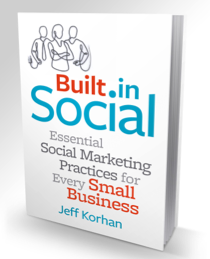
The practice of selling is traditionally considered a transaction or event in which there is an exchange of value between the buyer and seller, and presumably close to equal value.
If selling it is indeed an event, then by definition it has to be considered an ending.
No wonder most people find selling and associated practices such as cold-calling to be challenging.
Why not instead consider every single interaction with prospects and customers to be a new beginning of something that is more than a relationship with the business, but also every other buyers of that product or service?
It could absolutely change everything – and for the better.
The Business as A Connector
Prior to the digital age the relationship a business had with its buyers was all that mattered. Now the relationship buyers have with each other may be even more important, both for the them and the business.
Instead of focusing on individual buyers, smart businesses are learning to reframe their thinking to understand the dynamic of what is commonly referred to as the tribe, a community that is collectively more than the summation of all its members.
The tribe is a force that when harnessed can transform a business.
Has your business considered how it can bring its customers together to get to know each other? Live events used to be the only means for accomplishing this, but now that we have digital connectivity beyond measure, the possibilities are limitless – and so are the opportunities.
The breakthrough for building a tribe begins with giving as much consideration to connecting them with each other, as with the business itself. This should be a top priority of any social media strategy.
Nothing Connects Like Shared Ownership
Those of us that are active within content marketing circles have been using content in the form of blogs like this to build communities that are aligned with the value derived from it. For that to happen, there has to be an exchange of value, as well as interaction, which is getting increasingly difficult to achieve.
To have interaction that builds a tribe there has to be buy-in, and that often comes from ownership.
Ownership creates a strong, and hopefully permanent connection with your business, one from which a relationship can be built that transcends that transaction. More important is it also connects each buyer with each other.
Selling to buyers connects them to the business, as well as other buyers that share the same connection, one that can become the seeds of a tribe.
For months I’ve tracked those that have purchased a copy of my book. This includes social mentions and direct sales when I’ve presented at live events. They are my tribe, as I know many have recommended the book to others.
Do you own a copy of Built-In Social? Then you are in my tribe!
If so, please send me an email (or use this) so I can be sure to include you in my trusted inner circle.
I want to share with you what I’m working on next – and help you connect with other like-minded folks. Plus, you’ll get special offers that will never be offered anywhere else.
That’s a promise.
About the Author: Jeff Korhan, MBA, helps mainstream small businesses create exceptional customer experiences that accelerate business growth. Get more from Jeff on LinkedIn, Twitter and Google+.
Jeff is also the author of Built-In Social: Essential Social Marketing Practices for Every Small Business – (Wiley 2013)



